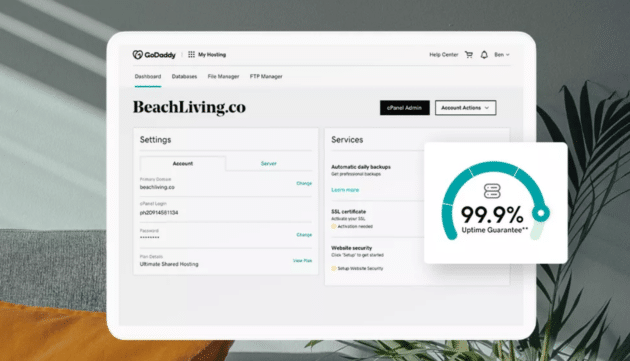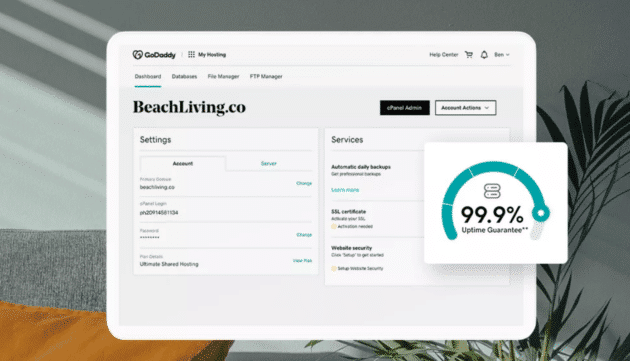GoDaddy Cloud Server – In the competitive world of web hosting and cloud computing, GoDaddy has established itself as a leading provider of domain registration, hosting services, and cloud infrastructure. The GoDaddy Cloud Server stands out as a scalable, reliable, and user-friendly solution for businesses and developers seeking robust cloud hosting.
This article provides an in-depth look at GoDaddy Cloud Server, highlighting its features, benefits, and practical applications to help you decide if it fits your hosting needs.

What is a GoDaddy Cloud Server?
GoDaddy Cloud Server is a cloud hosting service that provides businesses with on-demand resources for hosting websites, applications, and databases. Unlike traditional hosting, cloud servers leverage a network of virtual servers, ensuring scalability, flexibility, and redundancy.
GoDaddy’s cloud offerings cater to a wide range of users, from small businesses to developers, with features that prioritize simplicity, performance, and security.
Key Features of GoDaddy Cloud Server
- Scalability
One of the defining features of GoDaddy Cloud Server is its ability to scale resources up or down based on demand. This ensures optimal performance during traffic spikes and cost efficiency during periods of low activity.
- High Performance
GoDaddy’s cloud infrastructure is built on GoDaddy’s edge hardware and software, providing fast processing speeds, low latency, and SSD-based storage for improved performance.
- Easy Management
The platform offers an intuitive control panel, making managing server settings, applications, and resources easy. This is particularly beneficial for users without extensive technical expertise.
- Global Data Centers
GoDaddy operates data centers across multiple locations worldwide, ensuring low latency and reliable performance for users regardless of their geographical location.
- Robust Security
Security features such as firewalls, DDoS protection, SSL certificates, and regular updates help safeguard hosted applications and websites.
- Flexible Billing
GoDaddy provides flexible billing options, including pay-as-you-go models, allowing businesses to pay only for the resources they use.
- Developer-Friendly Tools
For developers, GoDaddy Cloud Server supports multiple programming languages, APIs, and frameworks, making it a versatile choice for application development and testing.
Benefits of Using GoDaddy Cloud Server
- Cost Efficiency
GoDaddy’s flexible pricing ensures you on the resources you use, eliminating the need for upfront capital investments in hardware.
- Easy Setup
Setting up a cloud server with GoDaddy is straightforward, thanks to its user-friendly interface and guided configuration process.
- Reliability and Uptime
With its robust infrastructure and multiple data centers, GoDaddy offers high uptime guarantees, ensuring uninterrupted access to your applications and websites.
- Enhanced Security
GoDaddy Cloud Server includes built-in security features to protect against common threats, giving users peace of mind.
- Wide Range of Use Cases
GoDaddy’s cloud servers can support various cases, from hosting e-commerce websites and blogs to running enterprise applications.
Use Cases for GoDaddy Cloud Server
- Website Hosting
GoDaddy Cloud Server is ideal for hosting personal blogs, business websites, and e-commerce platforms that require high availability and performance.
- Application Development and Testing
Developers can use GoDaddy’s cloud infrastructure to build Goaandloy applications in a flexible and scalable environment.
- Data Backup and Storage
The cloud server can be a secure location for storing critical data and creating backups, ensuring easy recovery in case of data loss.
- SaaS and PaaS Solutions
GoDaddy’s infrastructure supports SoftwarGoDaddy’srvice (SaaS) and Platform-as-a-Service (PaaS) models, enabling businesses to deliver innovative customer services.
- Enterprise Solutions
Organizations can use GoDaddy Cloud Server to host CRM systems, enterprise resource planning (ERP) platforms, and other mission-critical applications.
How to Set Up a GoDaddy Cloud Server
- Choose a Plan
Visit the GoDaddy website and select a cloud server plan that suits your needs. Consider factors such as storage, processing power, and bandwidth.
- Configure Your Server
During setup, you can customize your server specifications, such as operating system, storage capacity, and memory allocation.
- Launch and Access
Once configured, launch your server and access it through GoDaddy’s control panel or SSH (for advanGoDaddy’s).
- Install Applications
Install the necessary software, frameworks, or content management systems (e.g., WordPress) to get started with your project.
- Monitor and Optimize
Use GoDaddy’s monitoring tools to track resouGoDaddy’s performance and security, optimizing your server as needed.
Comparing GoDaddy Cloud Server with Competitors
GoDaddy Cloud Server competes with leading cloud hosting providers like AWS, Google Cloud, and Microsoft Azure. Here’s how it stacks up:
- Ease of Use
GoDaHere’s known for its user-friendly interfaces, making it a preferred choice for beginners and small businesses. Competitors like AWS offer more advanced features but may require technical expertise.
- Pricing
GoDaddy’s pricing is competitive, and straightforward providers like AWS and Azure often have complex pricing structures that can confuse new users.
- Features
While GoDaddy offers essential cloud hosting features, it may lack some advanced tools and integrations with AWS or Google Cloud.
- Support
GoDaddy provides 24/7 customer support through chat, email, and phone, ensuring readily available assistance.
Challenges of GoDaddy Cloud Server
- Limited Advanced Features
Compared to providers like AWS and Azure, GoDaddy Cloud Server may not offer as many advanced features or integrations.
- Scalability Limitations for Large Enterprises
While GoDaddy Cloud Server suits small to medium-sized businesses, large enterprises with complex needs may find more robust solutions elsewhere.
- Data Center Locations
Although GoDaddy has a global presence, its data center network is not as extensive as that of AWS or Google Cloud, which may impact latency for specific regions.
Tips for Maximizing GoDaddy Cloud Server
- Monitor Usage
Regularly review your resource usage to avoid overpaying for unused capacity.
- Implement Security Best Practices
Enable SSL certificates, update software regularly, and use strong passwords to enhance security.
- Optimize Performance
Use caching, content delivery networks (CDNs), and optimization plugins to improve website or application performance.
- Leverage SupportUsef GoDaddy’s customer support is used to resolvetecGoDaddy’s or optimize your setup.
The Future of GoDaddy Cloud Server
As cloud computing continues evolving, GoDaddy will likely enhance its cloud offerings with improved scalability, advanced integrations, and more sophisticated security measures. Future trends like AI-powered hosting and serverless computing may also shape the company’s roadmap.
Conclusion
The GoDaddycompany’srver is a versatile and user-friendly hosting solution that caters to small businesses, developers, and individuals seeking reliable cloud infrastructure. Its ease of use, scalability, and robust security make it an attractive choice for hosting websites, applications, and enterprise solutions.
While it may not offer the extensive feature set of larger providers like AWS or Google Cloud, GoDaddy’s straightforward pricing and intGintGoDaddy’sls make it a competitive option in the cloud hosting market. Whether you’re launching a personal project or a business application, GoDaddy Cloud Server provides a solid foundation for success in the digital age.

